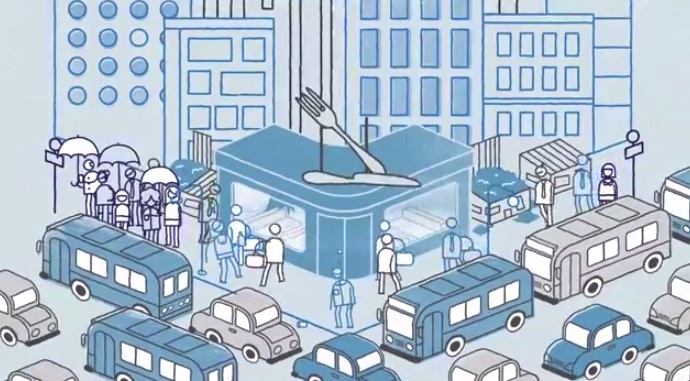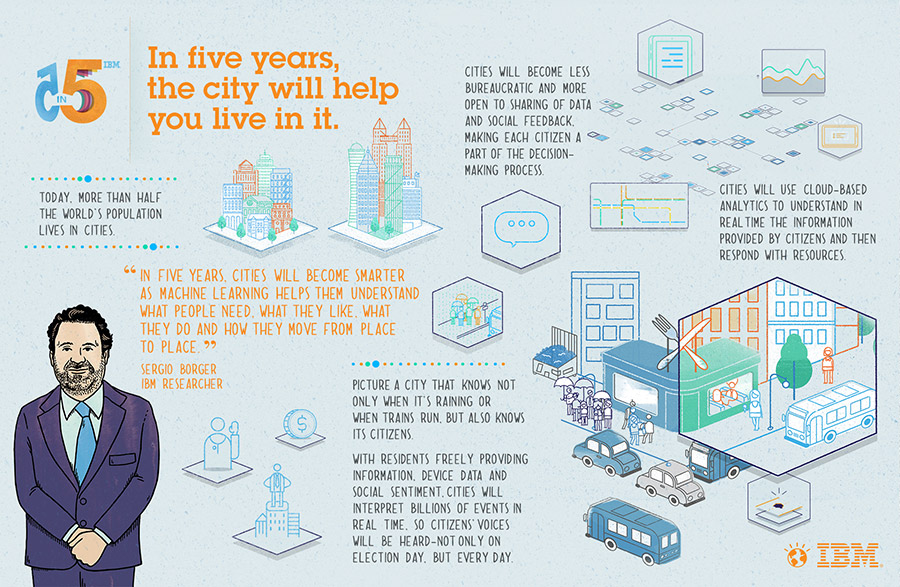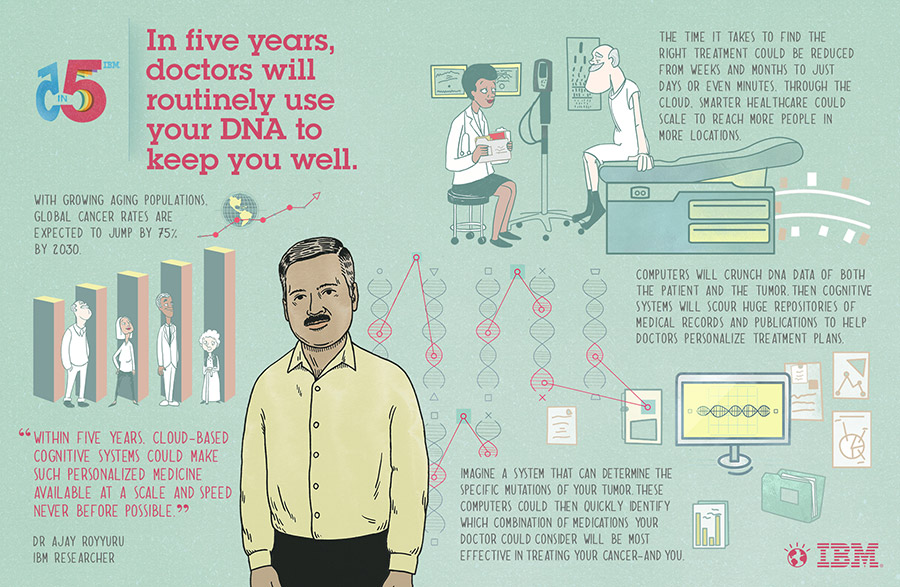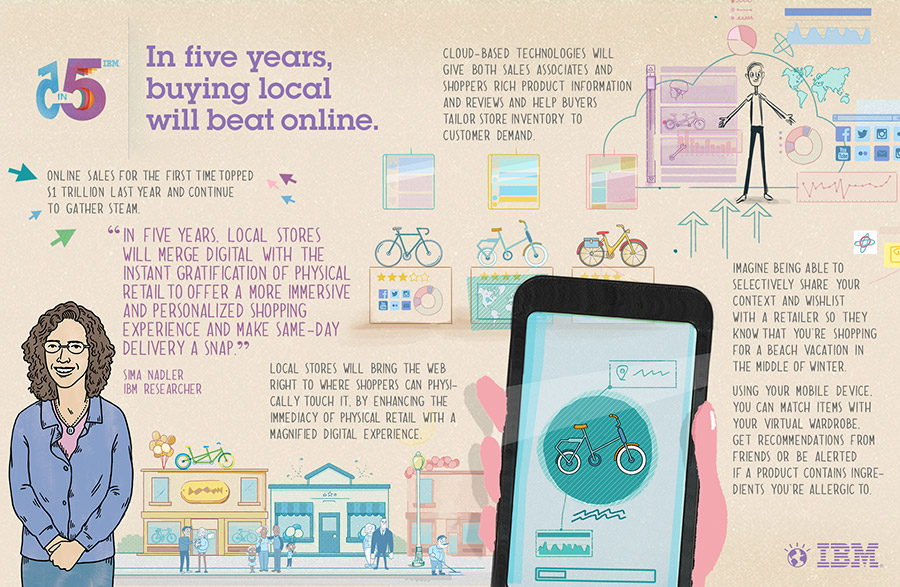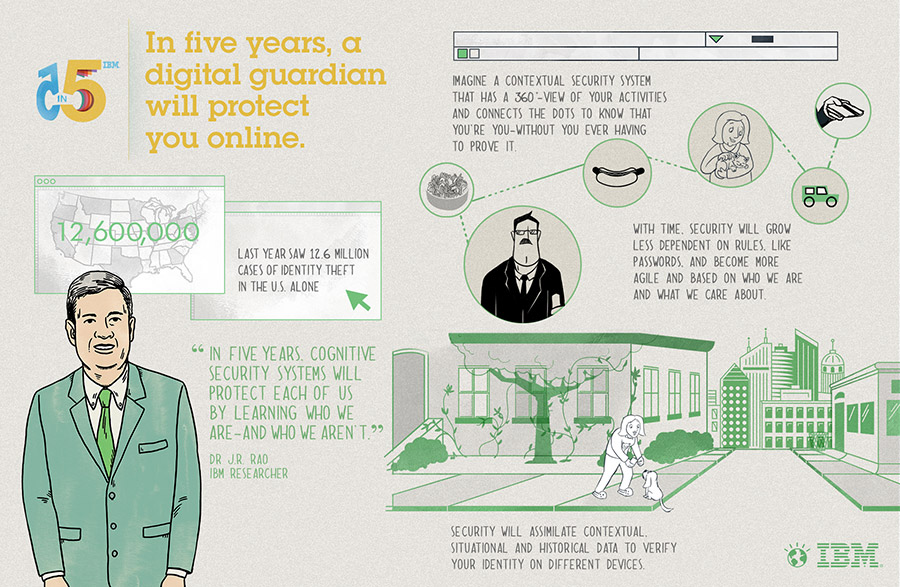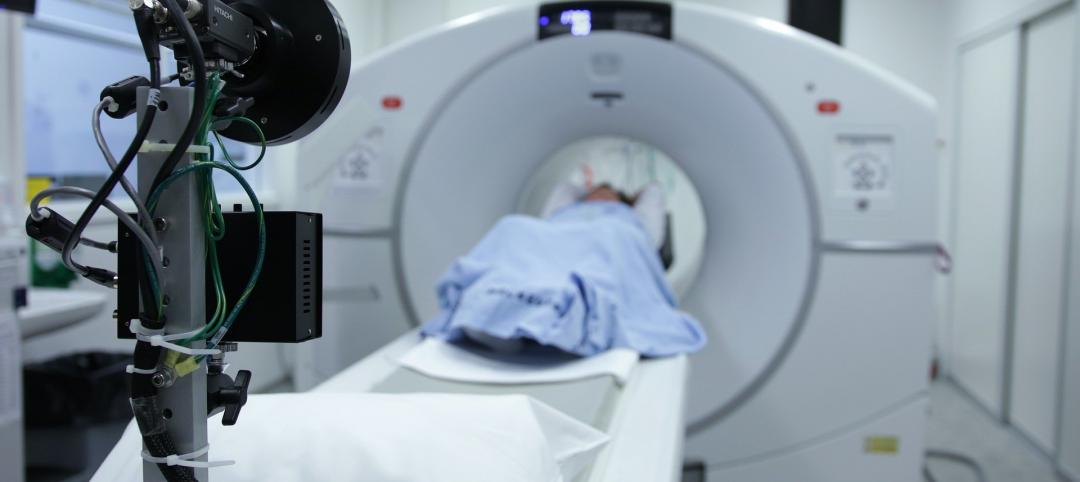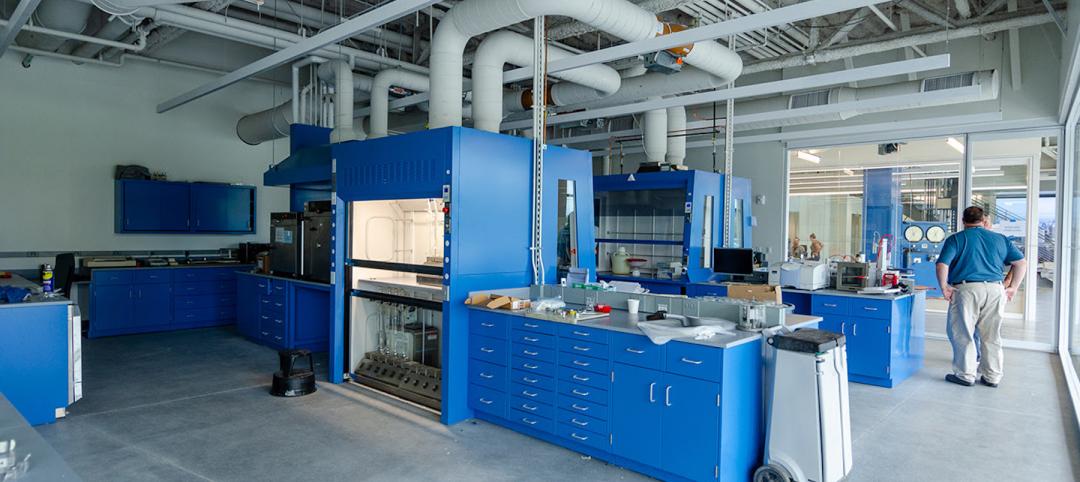Yes, it's the time of the year when everyone and their cousin reveals their bold predictions and big trends for the coming year. Tech giant IBM just released one of the better forward-looking reports: "The 5 in 5: Innovations That Will Change Our Lives in the Next Five Years," complete with videos and colorful infographics (see below).
As you would expect from IBM, all five innovation predictions are driven by emerging technologies, such as cloud computing, big data analytics, and learning technologies. At least three of their predictions have a direct relationship with the built environment, and all five are related to construction in some way.
Here are IBM's 5 in 5 innovation predictions (descriptions and graphics courtesy IBM):
1. The Classroom Will Learn You
The classroom of the future will learn about each individual student over the course of their education, helping them master the skills that match their goals.The rapid digitization of educational institutions will allow unprecedented instrumentation of the learning process. Cognitive computing, or learning technologies, will help us calculate everything we can about how each student learns and thrives, then create flexibility in the system to continually adapt and fine-tune what we deliver to that student and how this supports teachers and employers. More on this trend.
2. The City Will Help You Live In It
For citizens, smart phones enabled by cognitive systems will provide a digital key to the city. People can have fingertip access to information about everything that’s happening in the city, whether an experience is right for them, and how best to get there. Because these learning systems have interacted with citizens continuously, they know what they like—and can present them with options they might not find easily. More on this trend.
3. Doctors Will Routinely Use Your DNA To Keep You Well
Today, full DNA testing to help make treatment decisions is still rare. But cognitive systems and cloud computing may make this form of treatment mainstream. It could be done faster, more affordably and much more frequently. In addition to DNA testing for cancers, we may even see DNA-specific personalized treatment options for conditions such as stroke and heart disease. More on this trend.
4. Buying Local Will Beat Online
The technology trends will move us back to brick and mortar—but with a difference. In the future, retailers will layer increasing levels of engagement and personalization on top of the shopping experience, ultimately merging the instant gratification of physical shopping with the richness of online shopping and making same-day delivery a snap. More on this trend.
5. A Digital Guardian Will Protect You Online
Security is evolving from being based on rules, like passwords, to being automatic and made stronger through us just being us.This guardian will have your back, trained to focus on the people and items it is entrusted with based on a 360 degree of an individual’s data, devices and applications. It will make inferences about what’s normal or reasonable activity and what’s not, ready to spot deviations that could be precursors to an attack and a stolen identity. More on this trend.
Related Stories
Building Team | Apr 20, 2022
White House works with state, local governments to bolster building performance standards
The former head of the U.S. Green Building Council says the Biden Administration’s formation of the National Building Performance Standards Coalition is a “tremendous” step in the right direction to raise building performance standards in the U.S.
Market Data | Apr 20, 2022
Pace of demand for design services rapidly accelerates
Demand for design services in March expanded sharply from February according to a new report today from The American Institute of Architects (AIA).
Multifamily Housing | Apr 20, 2022
A Frankfurt tower gives residents greenery-framed views
In Frankfurt, Germany, the 27-floor EDEN tower boasts an exterior “living wall system”: 186,000 plants that cover about 20 percent of the building’s facade.
AEC Tech | Apr 19, 2022
VDC maturity and the key to driving better, more predictable outcomes
While more stakeholders across the AEC value chain embrace the concept of virtual design and construction, what is driving the vastly different results that organizations achieve? The answer lies within an assessment of VDC maturity.
Healthcare Facilities | Apr 19, 2022
6 trends to watch in healthcare design
As the healthcare landscape continues to evolve, IMEG’s healthcare leaders from across the country are seeing several emerging trends that are poised to have wide-ranging impacts on facility design and construction. Following are six of the trends and strategies they expect to become more commonplace in 2022 and the years to come.
Concrete Technology | Apr 19, 2022
SGH’s Applied Science & Research Center achieves ISO 17025 accreditation for concrete testing procedures
Simpson Gumpertz & Heger’s (SGH) Applied Science & Research Center recently received ISO/IEC17025 accreditation from the American Association for Laboratory Accreditation (A2LA) for several concrete testing methods.
Sponsored | BD+C University Course | Apr 19, 2022
Multi-story building systems and selection criteria
This course outlines the attributes, functions, benefits, limits, and acoustic qualities of composite deck slabs. It reviews the three primary types of composite systems that represent the full range of long-span composite floor systems and examines the criteria for their selection, design, and engineering.
Building Team | Apr 18, 2022
Shive-Hattery Acquires WSM Architects
Shive-Hattery announces that it has acquired WSM Architects, Inc., a 13-person architecture firm in Tucson, Arizona.
Building Team | Apr 15, 2022
Frank Gehry to design his largest building yet for his hometown of Toronto
Famed architect Frank Gehry will design his largest building to date for his hometown of Toronto, Canada.
Healthcare Facilities | Apr 14, 2022
Healthcare construction veteran creates next-level IPD process for hospital projects
Can integrated project delivery work without incentives for building team members? Denton Wilson thinks so.


